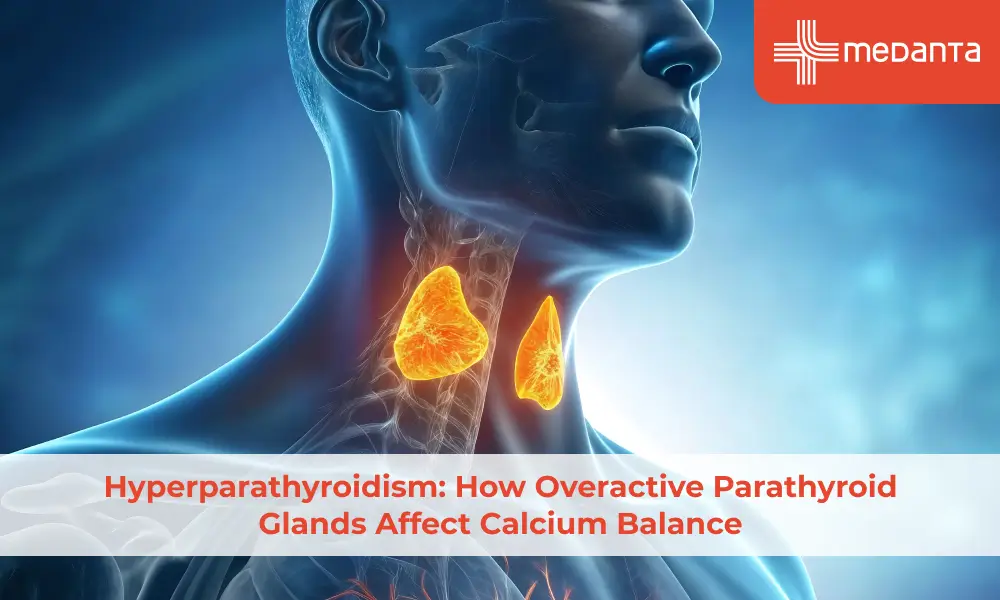Hyperparathyroidism: How Overactive Parathyroid Glands Affect Calcium Balance

TABLE OF CONTENTS
The body needs a perfect balance of hormones to work. When this balance shifts, health issues can show up. Hyperparathyroidism is one such problem that messes with how calcium is managed in the body. Dr. Deepak Sarin from Medanta Gurugram explains this disorder, what causes it and how it can affect health.
Explaining the Parathyroid Glands
Most people have four parathyroid glands in their neck. Even though they're close to the thyroid and share part of the name, these glands are separate and do something different. Dr. Sarin explains that these glands make a hormone called PTH, which helps control the amount of calcium in your blood.
What is Primary Hyperparathyroidism?
Primary hyperparathyroidism happens when the parathyroid glands become too active and stop following the body's normal control systems. The glands then make too much PTH, which raises calcium levels in the blood above normal.
Dr. Sarin explains that this is a condition where the glands become "out of control" and stop following the normal checks that manage hormone levels in the body.
How It Affects the Body
Primary hyperparathyroidism can create widespread effects involving several organ systems.
1. Bones
When blood calcium levels rise, much of this calcium comes from the bones. Dr. Sarin explains that this weakens bones over time and can increase the chances of fractures or even make them more prone to osteoporosis.
2. Kidneys
The kidneys filter the extra calcium in the blood and remove it through urine. This process may result in:
Problems in kidney function
Damage the kidneys
Development of kidney stones
3. Effects on Other Organs
Dr. Sarin states that elevated calcium levels in the blood can harm various organs.
Reasons Behind Primary Hyperparathyroidism
Dr. Sarin explains that primary hyperparathyroidism happens because of one of two reasons:
1. Single Gland Condition (Most Frequent)
Most of the time, a benign tumour named adenoma leads to primary hyperparathyroidism. This tumour forms in one of the four parathyroid glands. It makes the affected gland grow larger and release too much PTH.
2. Multiple Gland Issues (Not as Common)
Sometimes, all four glands grow bigger, which is a condition called hyperplasia. This shows a separate disease process and needs a unique way to treat it.
Why Diagnosis Matters
Dr. Sarin stresses that spotting if a patient has single-gland disease or multiple-gland issues is very important. It plays a big role in shaping the treatment plan and how the surgery is done. Doctors run tests to figure out the exact problem before starting any treatments.
Conclusion
Primary hyperparathyroidism happens when overactive parathyroid glands mess up calcium balance in the body. It might be due to a single adenoma or multiple gland hyperplasia. This health issue can harm the bones, kidneys and other organs. Getting the right diagnosis is key to planning the right treatment.
FAQs
What are the signs that someone might have hyperparathyroidism?
High calcium levels from hyperparathyroidism may cause tiredness, low energy, kidney stones, aching bones or stomach problems.
Can routine blood tests detect hyperparathyroidism?
Higher calcium levels are often noticed through routine blood tests and can point to hyperparathyroidism, prompting additional checks.
How do doctors treat hyperparathyroidism?
Treatment depends on whether one or several glands are involved. Surgery is most often the main option to treat primary hyperparathyroidism.
Can hyperparathyroidism go away on its own without treatment?
The glands become "overactive and out of control," which means the problem won’t fix itself and might even get worse without treatment.
Can hyperparathyroidism cause lasting harm to bones and kidneys?
Untreated hyperparathyroidism can seriously affect health. Long-term hyperparathyroidism causes weakening of the bones and may result in dysfunction or damage to the kidneys.






